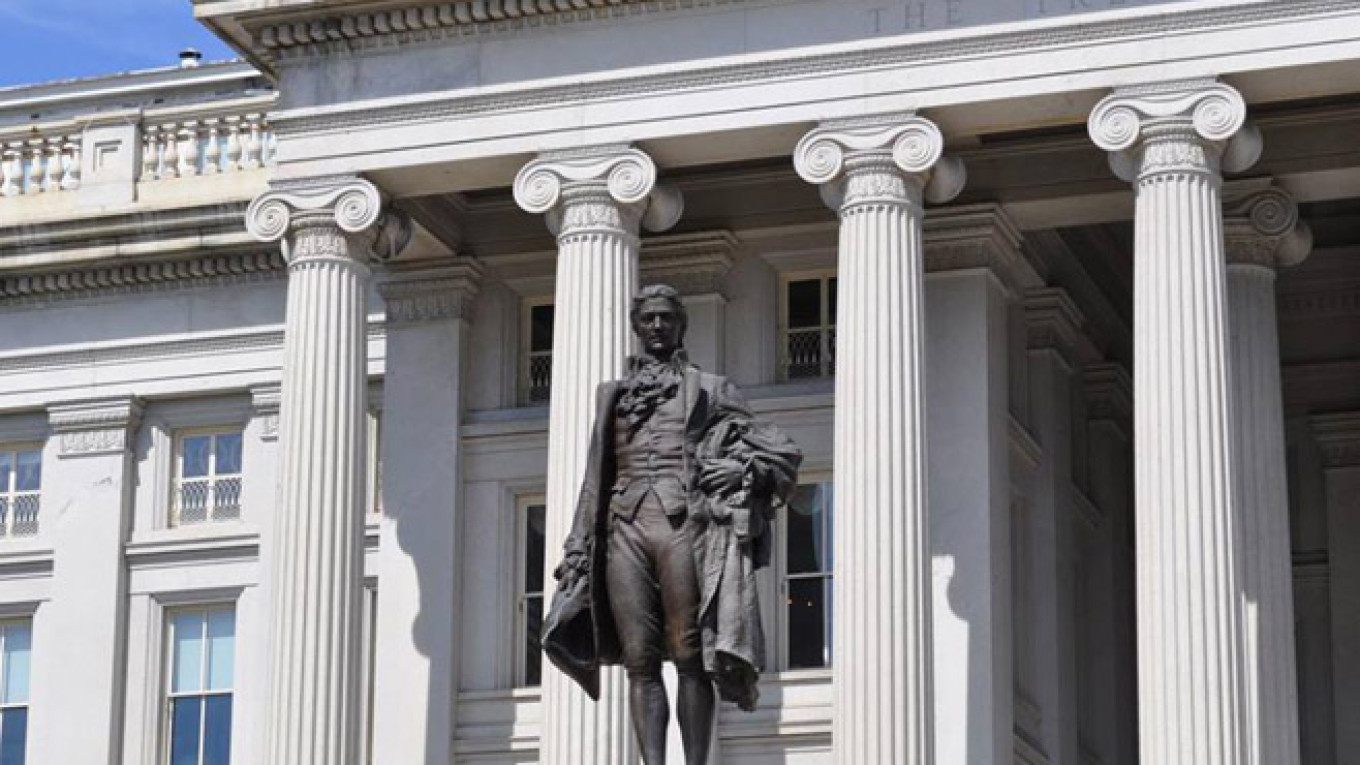With just one day left before the Russian financial system was to fall foul of the U.S. Treasury, President Vladimir Putin has signed a law allowing Russian banks to send information about U.S. tax payers to their native government and appease a contentious piece of legislation known as FATCA.
This will come as a relief to Russia's largest banks, who will face the equivalent of a 30 percent tax on various key investments in the U.S. — including the interest and dividend payments on U.S. securities, stocks and bonds — if they fail to comply with the U.S. regulations.
The Foreign Account Tax Compliance Act, or FATCA — which goes into force on July 1 — was initially devised in 2010 as a way to keep U.S. corporations and individuals from avoiding U.S. taxes by funneling money into accounts abroad. The law requires foreign banks to inform the IRS of any accounts held by U.S. taxpayers, to provide information about these accounts on the treasury's request and even to withhold money from clients suspected of tax evasion.
For over a year, the U.S. has been busily negotiating information-sharing agreements with countries worldwide. Eighty-six have already reached official or preliminary arrangements with the U.S., including China, who joined the list just last week, and known tax havens such as the Cayman Islands.
Russia is not on the list. The two sides were deep in negotiations up until March, but the Treasury Department quietly abandoned the talks after Russia's annexation of Crimea and the international condemnation that followed. Russian financiers were left in the lurch and on course to collide with FATCA's rapidly approaching July 1 deadline.
"I have not heard of any other countries who were in a similar situation, who were both deeply integrated into the international financial system and did not have an opportunity to finish the negotiations," said Konstantin Kochetkov, international partner and FATCA expert at the Moscow office of international law firm Morgan Lewis.
Fearful of the penalties for violating FATCA, Russia's second largest banking group, VTB, even decided to "phase out" relations with its 2,000 U.S. clients last month. Mikhail Zadornov, president of the group's retail division VTB 24, told Interfax on Monday that the bank no longer plans on cutting off its U.S. clients.
Garegin Tosunyan, head of? the Association of? Russian Banks, told The? Moscow Times prior to the law's signing that many Russian banks were waiting expectantly for government actions and, like VTB, would have dropped their U.S. clients if none was taken.
In its final form, the new law, signed by Putin on Saturday and published Monday on the government's legislation portal, will allow Russian banks to meet FATCA's requirements — but only under the constant and empowered scrutiny of domestic authorities.
Within three days of registering with foreign tax authorities, Russian financial organizations — including banks, life insurance agencies, stock market traders and more — will have to inform state market watchdog Rosfinmonitoring, the Federal Tax Service and the Central Bank that they have done so.
The banks will have to declare any foreign clients subject to foreign account legislation, such as FATCA, to these agencies, as well as announcing any requests for information from a foreign tax authority. Any information sent abroad must first be sent to them — 10 days in advance.
Rosfinmonitoring will also have the authority to unilaterally block information transfers abroad.
Banks will only be able to provide a taxpayers' information if the foreign citizen consents to it, but if they refuse, the banks will have the option of severing its contract with that client. Companies are considered foreign if more than 10 percent of their charter capital is controlled by entities registered outside Russia and its Customs Union partners Belarus and Kazakhstan.
The mere days between the law's signing and FATCA's deadline will not flummox internationally integrated Russian banks, who have long been preparing to comply with the legislation. A total of 515 Russian banks had registered with the IRS by early June, according to the U.S. Treasury.
As soon as news of the law's signing came out on Monday, Sberbank, Russia's largest lender,? published the new procedures for U.S. citizens on its website.
However, the fact that Russia never reached an intergovernmental agreement with the U.S. could prove a burden for the banks in practice, Kochetkov said. A treaty would have bridged the gap between the two alien legal systems, providing guidance in the uncertain cases that are bound to arise, but now the banks are on their own.
"In the absence of an intergovernmental agreement on FATCA, Russian banks have to deal with the U.S. tax legislation directly. This of course makes life somewhat more difficult," Kochetkov said.
See also:
Russian Banks to Help U.S. Tax Service After New FATCA Law Passed
Contact the author at d.damora@imedia.ru
A Message from The Moscow Times:
Dear readers,
We are facing unprecedented challenges. Russia's Prosecutor General's Office has designated The Moscow Times as an "undesirable" organization, criminalizing our work and putting our staff at risk of prosecution. This follows our earlier unjust labeling as a "foreign agent."
These actions are direct attempts to silence independent journalism in Russia. The authorities claim our work "discredits the decisions of the Russian leadership." We see things differently: we strive to provide accurate, unbiased reporting on Russia.
We, the journalists of The Moscow Times, refuse to be silenced. But to continue our work, we need your help.
Your support, no matter how small, makes a world of difference. If you can, please support us monthly starting from just $2. It's quick to set up, and every contribution makes a significant impact.
By supporting The Moscow Times, you're defending open, independent journalism in the face of repression. Thank you for standing with us.
Remind me later.


